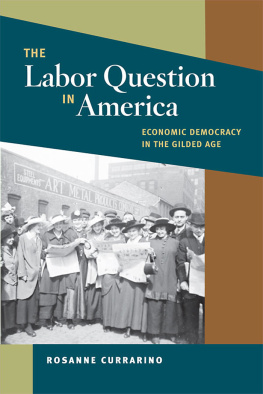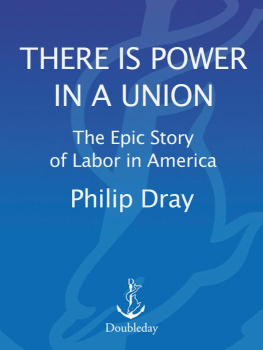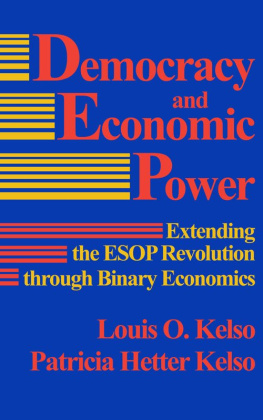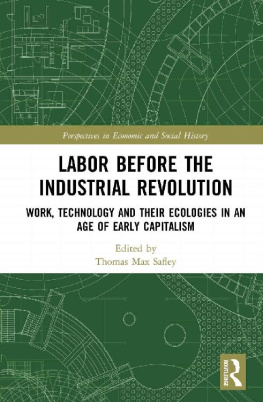2011 by the Board of Trustees
of the University of Illinois
All rights reserved
Manufactured in the United States of America
1 2 3 4 5 C P 5 4 3 2 1

This book is printed on acid-free paper.
Library of Congress Cataloging-in-Publication Data
Currarino, Rosanne.
The labor question in America : economic democracy
in the gilded age / Rosanne Currarino.
p. cm. (The working class in American history)
Includes bibliographical references and index.
ISBN-13: 978-0-252-03570-8 (hardcover: alk. paper)
ISBN-13: 978-0-252-07786-9 (pbk.: alk. paper)
1. Working classUnited StatesHistory19th century.
2. Working classUnited StatesHistory20th century.
3. LaborUnited StatesHistory.
4. United StatesSocial conditions18651918.
5. CitizenshipUnited States.
6. DemocracyUnited States.
I. Title
HD8072 .c927 2010
323.6097309034dc22 2010047169
For C.C.W.
Acknowledgments
Annual income twenty pounds, annual expenditure
nineteen six, result happiness. Annual income
twenty pounds, annual expenditure twenty
pound ought and six, result misery.
Charles Dickens, David Copperfield
Mr. Micawbers famous equation of happiness with freedom from debt applies mainly to personal finance, for in many other aspects of life, debt may be a happy thing. The debts I have incurred while working on this project are many and great, and they remind me over and again of the pleasure of scholarly work, the real joys of engaged debate, and the sheer fun of historical research. I cannot possibly repay these debts but only gratefully and happily acknowledge them.
At Rutgers University, I had the privilege of working with Jim Livingston, Sue Cobble, Jan Lewis and Jackson Lears. I offer thanks for the enthusiasm with which they asked questions and proffered advice. Sue Cobble in particular pushed me to hone my framework and focus. She and Michael Merrill gave me many much-appreciated comments and editorial suggestions.
Librarians at the Bancroft Library at Berkeley, the Bentley Historical Library at the University of Michigan, the Kheel Center at Cornell, the Manuscript Division of the Library of Congress, the New York Public Library, Queens, and Rutgers made my research both possible and enjoyable. I particularly thank David Kessler at the Bancroft, the late Stan Nash at Rutgers, and Harry Miller at the Wisconsin Historical Society. Funding from Rutgers University, Princeton University, and Queens University made those research trips possible. A year as a Mellon Fellow at the Penn Humanities Forum, made all the more congenial by Jennifer Conway, Eugene Narmour, and my fellow fellows, helped me further conceptualize this project.
Jerry Friedman, Rich Schneirov, Robyn Muncy, Robert Johnston, Larry Glickman, Kathy Peiss, and David Engerman slogged through a preliminary draft of the manuscript and offered invaluable feedback. Robert gave me one of the most detailed, helpful critiques of the project imaginable; it proved indispensable to revisions, even if I didnt follow absolutely all of his suggestions. Over the past few years, Jerry has skillfully edited my prose, improved my arguments, and cheered me on. At conferences, via e-mail, in the hallways, and over coffee, engaged, perceptive comments and suggestions from Leon Fink, Mary Furner, Lisa Fine, Jeff Sklansky, Shelton Stromquist, Thomas Winter, William Hagan, Jonathan Steinberg, Dan Bender, Andrew Isenberg, Petra Goedde, Sarah Wilson, and Alice Maurice have helped me clarify my arguments and think more broadly about the parameters of democracy in the United States.
I presented a draft of chapter 4 at the Penn Economic History Forum, skillfully run by Dan Raff. I thank the forum participantsin particular, Walter Licht and the late Alan Dawleyfor their generous comments. I gave an early draft of chapter 5 at the UMass-Amherst Economic History and Development Workshop and benefited enormously from the skeptical questions and gentle proddings of the audience. I especially thank Jerry Friedman, Carole Heim, and Daniel MacDonald.
An earlier version of chapter 4 appeared as The Politics of More: The AFL and the Idea of Economic Liberty, Journal of American History 93 (June 2006): 1736. I again thank Sue Cobble, Grace Palladino, Larry Glickman, and Richard Oestreicher for their comments on that paper as well as David Nord and Susan Armeny. Parts of chapter 3 were published as The Revolution Now in Progress: Social Economics and the Labor Question, Labor History 50 (February 2009): 117. An earlier version of chapter 2 was published as Meat vs. Rice: Working-Class Manhood and Anti-Chinese Hysteria, Men and Masculinities 9 (April 2007): 47690.
In New Jersey, Philadelphia, and now Ontario, the worlds of work and leisure have blurred pleasurably thanks to Jonathan Nashel, Rebecca Brittenham, David Engerman, Peter Cohen, Jacqui Spadaro, Daisy Fried, Jim Quinn, Alex Gillespie, Richard Ogden, Jeannine Delombard, Dan White, Andrew DuBois, Ben Weiner, Jeremy Lopez, Sarah Wilson, Mark Stabile, Alice Maurice, and Mark Rigby. At Queens, Im delighted to count Sandra den Otter, Andrew Jainchill, Rebecca Manley, Jeff McNairn, and David Parker as friends and collaborators.
As readers for the University of Illinois Press, Rich Schneirov and Larry Lipin gave the manuscript sharp, sympathetic readings and offered precise and extremely helpful comments and suggestions, as did series editor Alice Kessler-Harris. Ellen Goldlust-Gingrich skillfully copyedited the manuscript. Laurie Matheson has encouraged this project from the get-go. A more supportive, helpful editor I cannot imagine.
Matt Guterl reads almost everything I write, no matter how dreadful, and offers encouragement, criticism, and suggestions in equal measure, reminding me time and again that writing at its best is always a collaborative effort. Jim Livingston is the most relentlessly engaged historian I know. From his example, I have learned that narratives we create matter and that we write them every day, in the analysis of ideas and events both great and small. No lesson could be more important. Finally, my greatest debt is to Chris Warley, who, with endless patience and indefatigable enthusiasm, reads my drafts, refines my arguments, improves my prose, and keeps me on track.
The Labor Question in America







 This book is printed on acid-free paper.
This book is printed on acid-free paper.